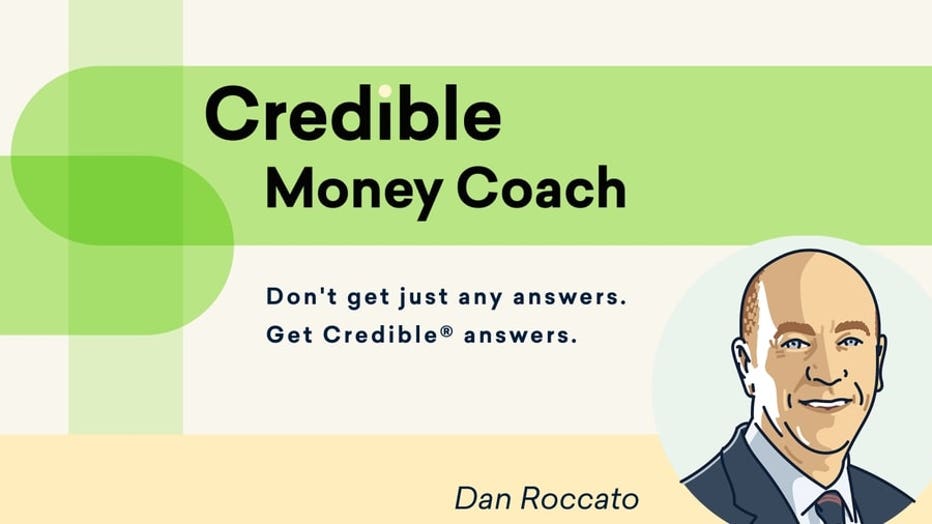I'm retired and still paying off my kids' student loans. Can I get them forgiven?
Our goal here at Credible Operations, Inc., NMLS Number 1681276, referred to as "Credible" below, is to give you the tools and confidence you need to improve your finances. Although we do promote products from our partner lenders, all opinions are our own.

Credible Money Coach replies to retiree question about getting parent student loans forgiven. (Credible)
Dear Credible Money Coach,
I have been trying to pay off my kids’ student loans for over 10 years and seem to not be getting the loan reduced fast enough. So I refinanced everything — total amount of the loan is $32,000. My question is, how can I get this loan forgiven under the current administration? I’m retired with a monthly income of $3,500. — Joe
Hi Joe, and thanks for your question. First, you’re not alone — about 2.8 million Americans age 60 and older are burdened with student loan debt, according to the Consumer Financial Protection Bureau. The majority of them borrowed to fund their child’s or grandchild’s education — not their own.
You’ve probably seen a lot in the news about the Biden administration taking steps to relieve the burden of student loan debt. But anything the federal government does by way of forgiveness or deferment will only apply to federal student loans.
I wish I had better news for you, but the bald truth is that private student loans don’t qualify for any kind of loan forgiveness. That’s because private student loans are made by private lenders, not the federal government.
You don’t say if the original student loans were federal or private. If they were federal, loan forgiveness might have been an option if you or your children met specific, strict qualifications. But once federal student loans are refinanced into private student loans, options like forgiveness and income-driven repayment plans disappear.
So what can you do?
Your next move really depends on your objective. Do you want to reduce your monthly payment amount to a more manageable sum? Are you looking to lower your interest costs over the life of the loan? Or do you want to pay off the full balance as soon as possible?
Talking with your lender about your options is a good place to start. If you’re struggling, a lender may be willing to offer flexible repayment options that could make your monthly payment more manageable.
You could also ask your lender about deferment or forbearance, but that’s just kicking the can down the road. Those options are meant to be temporary tactics to give you breathing room. They won’t make a dent in your debt and interest will continue to accrue, so these should really be your last options.
You don’t say when you last refinanced your loans, but if it was a year or more ago, it may be worth looking into refinancing again. Student loan refinance rates are significantly lower now than they were a year ago. Trimming your rate by even half a percentage point could equate to thousands of dollars in savings. But if you go this route, be sure to refinance into a shorter term. The last thing you want is to extend the time it takes to pay off this loan.
A final word …
You went above and beyond financially to help your children get a college education. Hopefully, your investment has paid off and their college degrees have helped them land well-paying jobs and achieve financial security.
If your kids are doing well financially — or even just OK — it’s perfectly reasonable for you to ask them to help you out with paying off the loans that funded their education, especially since you’re now on a fixed income. How that help looks is something you’ll need to talk to them about, and it could range from them taking over payments to making an extra monthly payment on your behalf so the loan gets paid off sooner.
Need credible advice for a money-related question? Email our Credible Money Coaches at moneyexpert@credible.com. A Money Coach could answer your question in an upcoming column.
This article is intended for general informational and entertainment purposes. Use of this website does not create a professional-client relationship. Any information found on or derived from this website should not be a substitute for and cannot be relied upon as legal, tax, real estate, financial, risk management, or other professional advice. If you require any such advice, please consult with a licensed or knowledgeable professional before taking any action.
About the author: Dan Roccato is a clinical professor of finance at University of San Diego School of Business, Credible Money Coach personal finance expert, a published author, and entrepreneur. He held leadership roles with Merrill Lynch and Morgan Stanley. He’s a noted expert in personal finance, global securities services, and corporate stock options. You can find him on LinkedIn.

